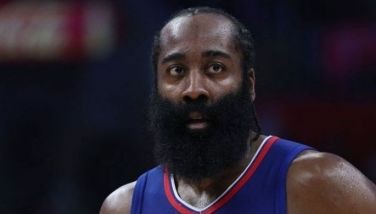Tracksters, triathletes Team Philippines best in Games
KUALA LUMPUR – The athletics team, with its five gold medals and 16 overall, and the triathlon squad, which made a rare 1-2, 1-2 sweep of the two individual events, emerged as the best performing multi-event sports among 37 disciplines in the 29th Southeast Asian Games.
The athletics team of Popoy Juico garnered five gold medals, and had three silver and 10 bronze medals from its 36-strong team.
It could have won seven or eight if not for the injury of pole vault record holder EJ Obiena, and injuries to Eric Shauwn Cray who took the silver in the 100m dash. Anthony Beram also tweaked his muscle, leaving the Philippines without a strong anchor in the 4x100m relay. Patrick Unso, a 110-m hurdles champion and a vital cog in the 1x100m relay, was sidelined by injury.
All four triathletes of Tom Carrasco had only themselves vying for the gold-silver medals in both the men and women individual events, leaving the bronze to Malaysia and Singapore in a rare 100 percent performance in any sport.
Other big winners were the boxing team which gained two gold medals in only six events on offer this year, matching perennial arch nemesis Thailand’s gold medal output. The two powerhouse countries dueled in a “championship” showdown either in the semis or finals to win the gold.
The other is gymnastics of Cynthia Carrion, whose wards Reyland Capellan (floor exercise) and Kaitlin Cera Liande de la Cruz de Guzman (uneven bars) retained their 2015 titles in artistic gymnastics.
Billiards kept the 9-ball singles titles through Chezka Centeno who won it in an All-Filipino title duel with Rubilen Amit, and Carlo Biado in the men’s 9-ball.
The Filipinos proved they can match the opposition in relatively new sports – ice hockey, figure skating, muay thai and squash. Squash made a good impression this year with two silvers and eight bronze medals. Things are looking up for the association and its present nationwide pool of only 15 players which are now being groomed for the world championships in preparation for the 2019 SEA Games.
At the bottom of the honor roll were lawn tennis, bowling, golf, swimming, shooting, table tennis, sailing and archery all major sources of gold in the previous SEA Games but have become causes of failure in Malaysia.
The associations lack the dynamic leadership needed to get their sport off the ground and at the highest competitive level, hounded either by political infighting.
The long drawn-out leadership crisis in the lawn tennis association remained unresolved, forcing top singles and doubles players to leave the association in favor of tournaments abroad. They are likely to turn pro, never to return to their mother association unless the crisis is over.
The bowling association resolved a leadership row by electing a different president, who has yet to launch a talent identification program from the clubs. The program has produced world professional champions in the World Cup out of its national amateur champions but has yet to produce SEA Games champions out of its professional players.
The system of selection of national players for the SEA Games put the golf association in the crossroads of a cold war among clubs and their golfers. Golfers, feeling on the losing end of “favoritism”, dropped out or were dropped out of the national team, while others have already turned pro and left the association.
- Latest
- Trending





























